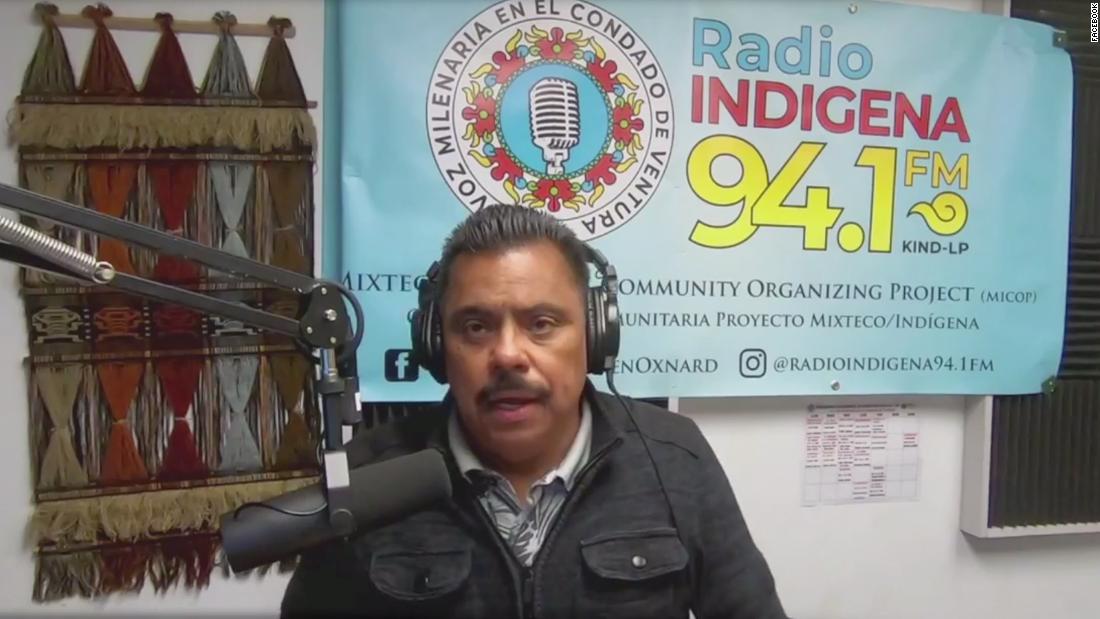You are here
Radio hosts were among the first who could explain Covid to indigenous Mexican farmworkers in US
Primary tabs
Mon, 2020-11-30 13:59 — mike kraft
 Radio hosts were among the first who could explain Covid to indigenous Mexican farmworkers in US After a day picking cranberries at a California farm, Josefino Cervantes Alvarado sat down for dinner to a unique mix of voices and music filling the room. CNN
Radio hosts were among the first who could explain Covid to indigenous Mexican farmworkers in US After a day picking cranberries at a California farm, Josefino Cervantes Alvarado sat down for dinner to a unique mix of voices and music filling the room. CNN
 Radio hosts were among the first who could explain Covid to indigenous Mexican farmworkers in US After a day picking cranberries at a California farm, Josefino Cervantes Alvarado sat down for dinner to a unique mix of voices and music filling the room. CNN
Radio hosts were among the first who could explain Covid to indigenous Mexican farmworkers in US After a day picking cranberries at a California farm, Josefino Cervantes Alvarado sat down for dinner to a unique mix of voices and music filling the room. CNN ... When the Covid-19 pandemic first hit the United States, the hosts of Radio Indígena were among the first people who could explain Covid-19 to indigenous Mexican farmworkers in Ventura County, thanks to their ability to switch between Spanish, Mixteco and other indigenous languages. As the months passed, they took to debunking coronavirus misinformation.
The Mixteco/Indigena Community Organizing Project (MICOP), a group that runs the radio station and helps indigenous families in Ventura and Santa Barbara counties, estimates that about 20,000 people from southern Mexico live in the area. Most of them are farmworkers and some only speak their indigenous language.
A 2015-2016 national survey by the US Department of Labor indicates that 77% of farmworkers are more comfortable speaking Spanish, 21% English and 1% prefer an indigenous language. The workers who were interviewed were fluent in at least 10 different indigenous languages.
Radio Indígena was created in 2014 as an arm of MICOP to provide information about labor rights and health programs to indigenous Mexican farmworkers in their native languages. It started streaming shows online and has expanded to FM radio, iOS and Android apps and a call-in number.
Currently, the station broadcasts 40 hours of original shows in Spanish and the indigenous languages of Mixteco, Zapoteco and Purépecha. They focus on a variety of topics, including immigrant rights, domestic violence prevention and indigenous history. Genevieve Flores-Haro, associate director for MICOP, estimates that about 3,000 people listen to the station daily. ...
Bernardino Almazán, a producer who used to work picking cilantro, said one of the biggest challenges in the early months of the pandemic was explaining what Covid-19 was. The Mixteco language, he says, dates back at least 2,000 years and does not include modern medical terminology. ...
Almazán and his colleagues have found themselves debunking false information and rumors about the cost of Covid-19 tests and the contents of a coronavirus vaccine in development.
For example, they had to clarify that undocumented immigrants who seek medical attention due to Covid-19 wouldn't be affected by the "public charge" rule, a federal provision that makes it more difficult for immigrants to obtain legal status if they use public benefits like food stamps and housing vouchers.
Another conspiracy theory that the hosts have addressed is whether Microsoft founder Bill Gates wanted to use a potential coronavirus vaccine to implant tracking devices in people. Gates addressed the rumors last July during a CNN global coronavirus town hall.
"We recommend that they don't pay attention to gossip circulating in social media or to people who may not have accurate information," Francisco Didier Ulloa, the station's coordinator and Almazán's co-host, said in Spanish. "Our duty is to report responsibly." ...
Country / Region Tags:
Problem, Solution, SitRep, or ?:
Groups this Group Post belongs to:



Recent Comments